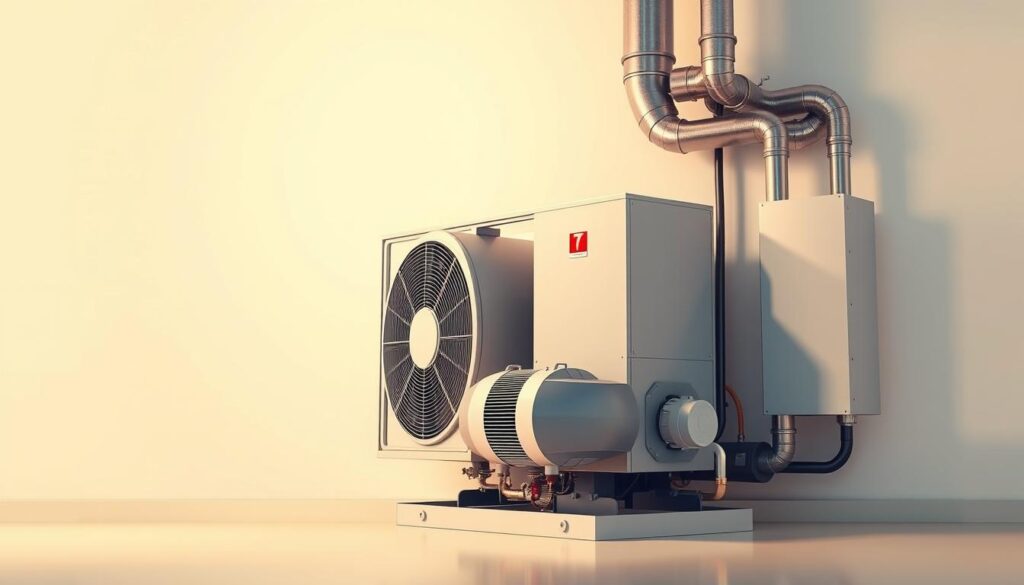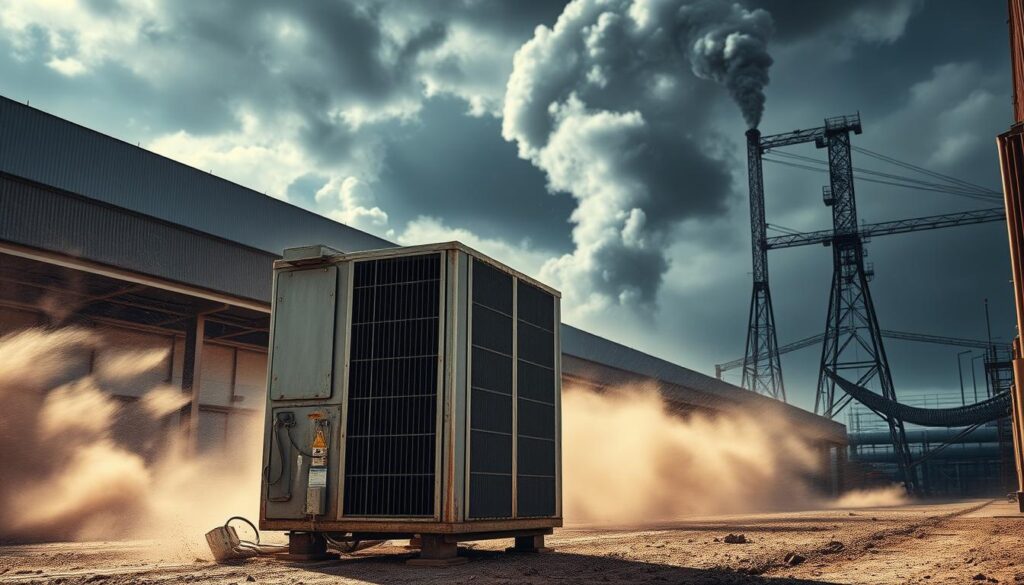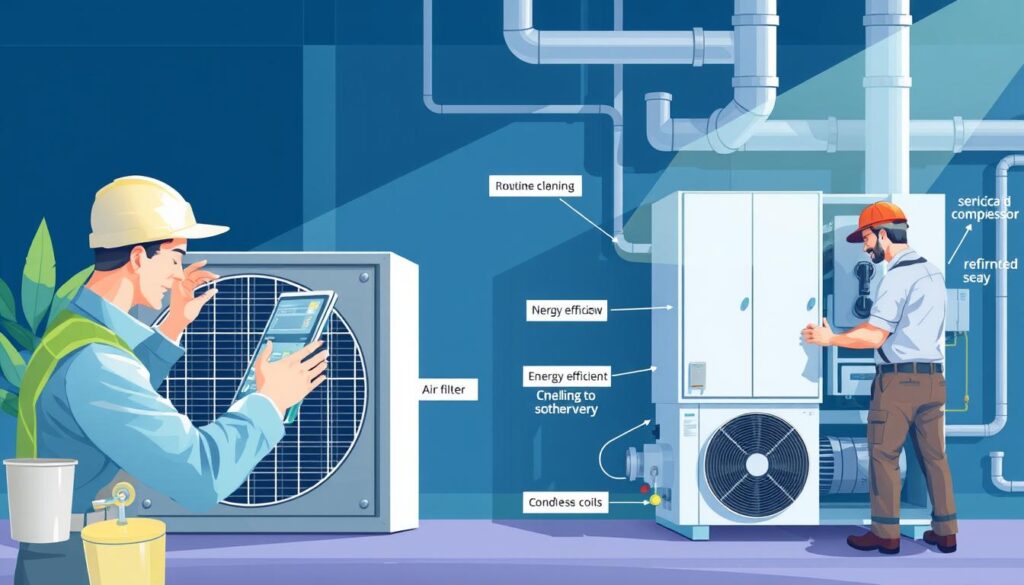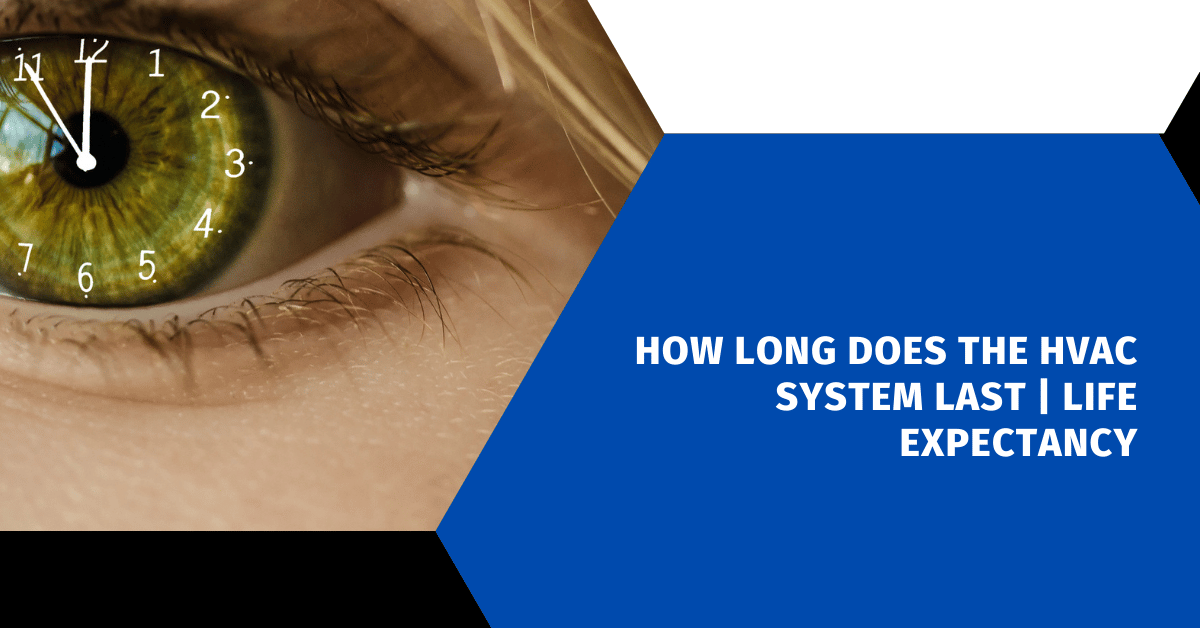Affiliate Disclosure
HVAC Guide Guys is a participant in the Amazon Services LLC Associates Program, an affiliate advertising program designed to provide a means for sites to earn advertising fees by advertising and linking to Amazon.
How Long Does The HVAC System Last? Ever thought about how long your home’s HVAC system will last? Knowing how long it will last is key for keeping your home comfy and your wallet happy.

Most HVAC systems are built to last 15 to 25 years. But, it’s not a sure thing. How long it lasts depends on many things like how well you take care of it, how often you use it, and the weather around you. Knowing this can help you plan for when you might need a new one and avoid sudden breakdowns.
Looking after your HVAC system well can make it last longer. Getting regular check-ups from pros, fixing problems fast, and knowing what your system needs are all important. They help keep it running well and lasting longer.
Key Takeaways
- Typical HVAC system lifespan ranges from 15 to 25 years
- Maintenance plays a critical role in system longevity
- Environmental factors can impact system durability
- Regular professional inspections are recommended
- Age and efficiency should guide replacement decisions
Table of Contents
Understanding HVAC System Lifespans: A Complete Guide
Your HVAC system is key to your home’s comfort. Its lifespan depends on many factors. Knowing how long different parts last helps you plan for upkeep and future replacements.
Homeowners need to know the usual lifespans of different HVAC systems. Each type lasts a certain amount of time, affecting its performance and reliability.
Average Lifespan by System Type
Here’s how long different HVAC systems usually last:
- Furnaces: 15-25 years
- Air Conditioners: 10-15 years
- Heat Pumps: 10-20 years
- Boilers: 20-30 years
Factors Affecting HVAC Longevity
Several things can affect how long your HVAC system lasts:
- How well it was installed
- The environment it’s in
- How often you use it
- Extreme weather conditions
The Role of Regular Maintenance
Keeping your HVAC system in good shape is vital. Regular checks by professionals can make it last longer.
| Maintenance Activity | Frequency | Impact on Lifespan |
|---|---|---|
| Air Filter Replacement | Every 1-3 months | Reduces system strain |
| Professional Inspection | Twice per year | Prevents major breakdowns |
| Duct Cleaning | Every 3-5 years | Improves system efficiency |
Pro tip: Regular maintenance can add years to your HVAC system’s life. This can save you a lot of money on replacements.
Explore Our HVAC Shop
Looking for top-rated HVAC tools, parts, and accessories? Visit our shop and find the perfect solution for your needs.
Visit the ShopHow Long Does The HVAC System Last in Different Home Settings
Your home’s environment greatly affects your HVAC system’s life and performance. Different settings can change how long your system works well.
Coastal and humid areas are tough on HVAC systems. Salt and high moisture can cause corrosion and shorten lifespan. Homeowners in these places might see their systems last less than in drier climates.
- Coastal areas: Reduced system lifespan due to salt corrosion
- Humid regions: Higher risk of moisture-related damage
- Desert climates: Extreme temperatures increase system stress
Several factors affect your HVAC’s efficiency:
- Home insulation quality
- Size of living space
- How often you use the system
- Local climate conditions
Keeping your system in good shape is key in tough environments. Regular professional inspections can spot problems early and extend your system’s life.
Proactive maintenance can potentially add years to your HVAC system’s operational life.
Heat pumps are very flexible in different homes. With the right care, they can last up to 25 years. They also use up to 50% less energy than traditional systems.
Explore Our HVAC Shop
Looking for top-rated HVAC tools, parts, and accessories? Visit our shop and find the perfect solution for your needs.
Visit the ShopTypical Lifespan of Different HVAC Components
Knowing how long different HVAC parts last helps you plan when to replace or upgrade your system. Each part’s lifespan varies based on how much it’s used, how well it’s maintained, and the environment it’s in.
It’s important to know how long each part of your HVAC system lasts. This helps you budget and plan for future needs. Let’s look at the typical lifespan of key HVAC components:
Central Air Conditioning Units
Central air conditioning systems usually work well for 12 to 15 years. How long they last depends on regular maintenance, the climate, and how well they were installed. Getting regular professional check-ups can help them last longer.
Furnace and Heating Systems
Gas furnaces can last up to 20 years, while oil furnaces usually last 10 to 15 years. Keeping them well-maintained is key to their performance.
Heat Pumps and Mini-Split Systems
Heat pumps generally last 10 to 15 years. Mini-split systems can last 10 to 16 years. Places near the coast might see shorter lifespans due to salt and humidity.
- Central air conditioners: 12-15 years
- Gas furnaces: 15-20 years
- Heat pumps: 10-15 years
- Mini-split systems: 10-16 years
“The key to maximizing your HVAC system’s lifespan is consistent, professional maintenance and timely repairs.”
Keep in mind, these are just averages. Your system’s actual performance can vary based on its installation, how it’s used, and regular upkeep.
Environmental Impact on HVAC System Durability

Your HVAC system’s life depends a lot on your home’s environment. Different climates and challenges can really affect how well it works and how long it lasts.
Living near the coast has its own set of problems for your HVAC. The salty air and high humidity can make parts rust and wear out faster. This means coastal homes often see their HVAC systems last only 7-12 years, compared to 15-20 years elsewhere.
- Extreme temperatures stress HVAC components
- High humidity increases the risk of moisture damage
- Air pollution can lower system performance
- Dust and debris can hurt hvac efficiency
To keep your HVAC system in good shape, you need to take care of it based on your local weather. Getting regular checks from a pro can spot and fix problems early, before they get worse.
| Environmental Factor | Impact on HVAC Durability |
|---|---|
| Coastal Saltwater Exposure | Accelerated Corrosion |
| Extreme Heat | Increased Mechanical Stress |
| High Humidity | Potential Moisture Damage |
| Air Pollution | Reduced System Efficiency |
“Environment is everything when it comes to maintaining your HVAC system’s health and performance.” – HVAC Maintenance Expert
By being proactive and knowing your local weather, you can make your HVAC system last longer and work better.
Explore Our HVAC Shop
Looking for top-rated HVAC tools, parts, and accessories? Visit our shop and find the perfect solution for your needs.
Visit the ShopSigns Your HVAC System Needs Replacement
Knowing when your HVAC system needs a new one can save you a lot of money and time. Spotting the warning signs early lets you plan for a smooth replacement before it fails completely.
Modern homeowners should look out for certain signs that it’s time for hvac repair or a full replacement.
Rising Energy Bills Signal System Inefficiency
Unexpected jumps in your energy bills might mean your HVAC system is working too hard. Older systems use up to 30% more energy than newer ones. If your bills go up without reason, it’s time to check.
- Energy bills increasing by 20% or more annually
- Inconsistent energy consumption patterns
- System running longer to maintain temperature
Frequent Repairs and System Breakdowns
Constant repairs can cost more than getting a new system. Homeowners often spend $150 to $500 a year on repairs for old HVAC systems.
| Repair Cost Range | System Age Recommendation |
|---|---|
| $0-$500 | Minor maintenance likely |
| $500-$1000 | Consider system evaluation |
| $1000+ | Replacement recommended |
Inconsistent Temperature Control
Uneven heating or cooling in your home might mean your HVAC system is failing. Temperature differences of more than 3-4 degrees between rooms show your system can’t distribute air well.
- Cold or hot spots in different rooms
- Thermostat struggles to maintain set temperature
- Delayed response when adjusting settings
Acting on these signs early can help you manage your hvac replacement timeline well. This prevents sudden failures and keeps your home comfortable.
Maximizing Your HVAC System’s Lifespan

To keep your HVAC system in top shape, you need a solid maintenance plan. By following key steps, you can make your heating and cooling last longer. This keeps your system running efficiently.
Regular upkeep is key to keeping your HVAC system in great condition. Here are some important steps to help your system last longer:
- Replace air filters every 1-3 months to prevent efficiency loss
- Schedule professional inspections twice annually
- Clean outdoor condenser units regularly
- Monitor and control indoor humidity levels
- Use programmable thermostats for smart temperature management
Being proactive with HVAC maintenance can really pay off. Well-cared-for systems can last up to 20 years. This is compared to just 10-15 years for systems that are not maintained.
| Maintenance Practice | Potential Efficiency Improvement | Lifespan Impact |
|---|---|---|
| Regular Filter Changes | Up to 15% improvement | Extended system life |
| Professional Inspections | 10-30% efficiency gains | 50% reduction in repair costs |
| Humidity Control | Reduces system workload | Prevents premature wear |
By consistently maintaining your HVAC system, you protect it and ensure it works well for years. Smart care today prevents costly replacements tomorrow.
Explore Our HVAC Shop
Looking for top-rated HVAC tools, parts, and accessories? Visit our shop and find the perfect solution for your needs.
Visit the ShopThe Impact of Installation Quality on System Longevity
Your HVAC system’s performance and lifespan depend a lot on how well it’s installed. Getting it installed by professionals can greatly improve its efficiency and how long it lasts.
Professional vs DIY Installation
DIY HVAC installation might save money upfront. But, it’s risky. Experts have the skills to install your system right, ensuring it works well.
- Professionals understand complex technical requirements
- They ensure proper electrical connections
- Expert installers minimize system damage
- Professional installation keeps warranties valid
Proper Sizing and Configuration
Getting your HVAC system sized just right is key for efficiency. The wrong size can cause big problems:
- Undersized systems work too hard, wearing out faster
- Oversized systems turn on and off too much, shortening lifespan
- Right sizing saves energy and money
Choosing professional HVAC installation boosts your system’s performance. It can even make your system last up to 25% longer than a poorly installed one.
Conclusion
Knowing how long your HVAC system lasts is key to a comfy and efficient home. Most systems work well for 15 to 25 years. By taking care of it early, you can make it last longer.
Regular upkeep and timely upgrades prevent sudden failures and expensive fixes. This way, you avoid the hassle and cost of emergency repairs.
Looking after your HVAC system is a smart move. Change filters often, get professional checks, and watch for signs like high bills or uneven temps. This keeps your system running smoothly.
Choosing the right upgrades is important. Look at your system’s age, how it’s doing, and any past fixes. New systems use less energy and save money over time.
Plan ahead for a new system before it breaks down. This lets you pick the best one for your home’s needs.
Your HVAC system’s life depends on your care and smart choices. Stay informed and proactive. This way, you’ll enjoy a cozy home and get the most from your system.

